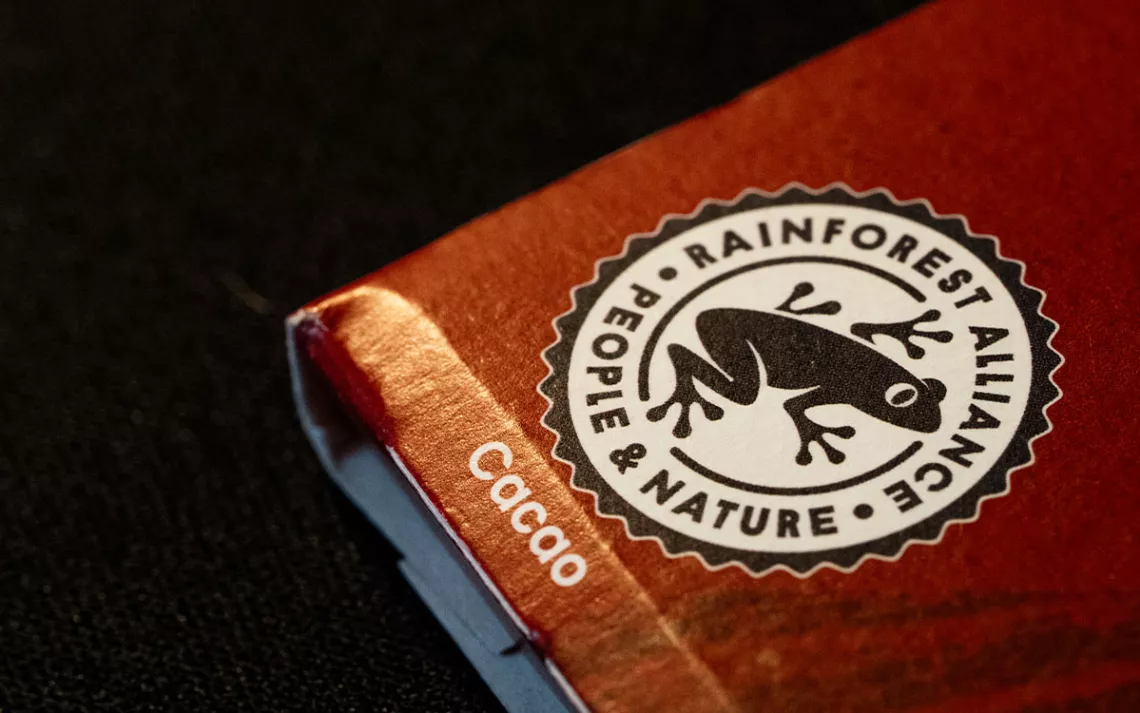Rainforest Alliance and Hershey Sued for Falsely Claiming Fair Labor and Sustainability
The class action lawsuit seeks to hold ecolabel certifiers accountable

Photo by Richard Mundl/CTK via AP Images
If you are eco-conscious and enjoy chocolate, chances are you look for Rainforest Alliance’s certification label with the frog logo when making your choices. That certification is supposed to signal to you at-a-glance that the company that made the tasty treat sourced it sustainably and ethically. The label can be found not just on chocolate but on everything from coffee and tea to bananas and flowers. Rainforest Alliance encourages consumers to “find the frog” when they go shopping.
Those products may not be as sustainable or ethical as you think, according to a class action lawsuit filed today in the US District Court Northern District of Illinois.
The law firm Richman Law & Policy has sued Rainforest Alliance and the Hershey Company for false and deceptive claims about child labor, labor practices, and deforestation. The suit, filed on behalf of plaintiff Eric Yeh and others, charges that Rainforest Alliance’s certification standards lack sufficient mechanisms to ensure that Hershey’s organic and plant-based chocolate products made with Rainforest Alliance–certified cocoa are ethically sourced or sustainable.
The suit is innovative because it seeks to hold both the manufacturer and the certifier accountable.
“We believe this case sheds important light on how third-party certifiers, such as Rainforest Alliance, play an integral role in deceiving consumers about the supply chains of the products they are paid to certify,” Phoebe Gittelson, a lawyer with Richman Law & Policy, told Sierra. “Consumers, like our client, seek out and trust these seals when making purchases, often paying a premium for products that they are led to believe are ethically sourced. Major companies like Hershey and Rainforest Alliance should be held accountable for misleading consumers.”
The lawsuit also alleges conflict of interest. For example, farms and companies like the Hershey Company pay certifiers like the Rainforest Alliance to audit them, creating a financial incentive between both parties. Rainforest Alliance also earns royalties based on the volume of cocoa beans (or coffee, tea, flowers, or other items) that companies purchase from Rainforest Alliance–certified farms. That provides a significant incentive to increase the marketability of food companies like Hershey to consumers. As of December 2022, 63 percent of Rainforest Alliance’s revenue was from royalties.
Studies consistently find that common labor and environmental audits in a variety of different industries, whether it is in food, fashion, or manufacturing, lack merit. For example, a 2021 analysis of 40,000 labor audits worldwide found that nearly half of those audits had relied on forged or suspicious documents. Another study found that auditors report fewer violations when the company being audited pays for that process.
In 2018, the Rainforest Alliance merged with UTZ, a company with a known history of supplying cocoa using child labor. Both before and after 2018, numerous examples of child labor have been discovered at Rainforest Alliance–certified farms. According to the Department of Labor, there are approximately 1.56 million children working on cocoa farms in Côte d’Ivoire and Ghana. Roughly two-thirds of the world’s cocoa supply comes from those two countries, and Hershey Company sources its cocoa from there as well. International authorities consider this cocoa farming to be one of the "worst forms of child labor.” Reports as of December 2020 show that the Hershey Company can’t account for the origin of its cocoa 50 percent of the time.
The lawsuit alleges that certifiers like the Rainforest Alliance are giving consumers a false notion that their ecolabels guarantee that no child labor was used in the making of the product bearing those labels. In 2020, Rainforest Alliance created new standards, but it uses an “assess and address” framework that only remedies harms after they’ve been discovered, and those farms can still stay certified. Also, from July 1, 2021, to June 30, 2022, Rainforest Alliance allowed all audits to be done remotely, with no auditor physically present at the farms.
According to the complaint, “Rainforest Alliance is paying well below the necessary living income to farmers for its certified cocoa.”
Rainforest Alliance has also been linked with deforestation. Almost 10 million acres of African forests are being cut down annually, at almost double the rate of the world’s deforestation average, with cocoa farming contributing to much of the deforestation. In 2019, Rainforest Alliance admitted identifying severe noncompliance among certificate holders in West Africa for deforestation in protected areas, the lawsuit alleges.
When contacted by Sierra, Hershey declined to make a statement, saying the company does not comment on active litigation.
After publication of this article, the Rainforest Alliance sent the following statement to Sierra: "While certification serves as a valuable mechanism for mitigating risks and promoting responsible practices, it's essential to recognize that no single organization can solve deeply complex challenges on its own. These issues demand a broader and more holistic approach encompassing systemic change, including legislation and regulatory reforms, education, and a commitment to tackling the root causes."
Consumers who bought Hershey’s organic and plant-based chocolate might be eligible to submit claims for compensation if Rainforest Alliance and the Hershey Company settle. There are chocolate brands with better track records for sustainable and equitable sourcing that don’t rely on the Rainforest Alliance certification. Click here for how to find them.
 The Magazine of The Sierra Club
The Magazine of The Sierra Club



